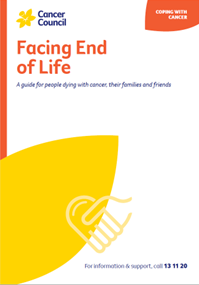- Home
- About Cancer
- Advanced cancer
- Facing end of life
- Choosing where to die
- In a palliative care unit
In a palliative care unit
A palliative care unit is a specialised palliative care facility. It is sometimes called a hospice, and may be a standalone facility or rooms within a hospital.
Learn more about:
- What do palliative care facilities offer?
- When to contact a palliative care facility
- Key points about a palliative care unit
What do palliative care facilities offer?
The focus at a palliative care unit is on caring for people with a life- limiting illness and maintaining quality of life. They are run by health professionals who specialise in providing physical and emotional comfort to the patient, and supporting family before and after death.
Palliative care units and hospices are different from most hospital wards. They are usually quieter and calmer, and may have a more homely environment. Many people value the relaxed surroundings, as well as the skilled staff and expert symptom management.
These facilities often provide short-term respite care as well as longer- term care for the dying person. Sometimes you can go back and forth between a palliative care unit and another setting during your final weeks. Many facilities now have a maximum length of stay, so you may want to check this with them ahead of time.
You may choose this option if you want to relieve your family from caring for you while you are dying, although they can still be involved. This can include feeding, bathing or simply being present.
When to contact a palliative care facility
Some people and their family and friends are unsure of when to contact a palliative care unit. They may wait to call until the final days, possibly missing out on the support that a palliative care team has to offer. Some facilities have waiting lists, so talk to your doctor or palliative care team early about how you should make arrangements and when would be an appropriate time to make the first contact.
Key points about a palliative care unit
- Palliative care units offer a welcoming and comfortable physical environment.
- Health professionals can provide 24-hour care, including expert pain and symptom control.
- The focus is on quality, not length, of life.
- You can focus on being with family and friends rather than on any care needs.
- It may give direct access to a team of professionals and volunteers trained to meet the needs of the dying person and their carers.
- Carers can leave at the end of the day and get some rest.
- Some families prefer not to live in a house where someone has died, although others find this comfort.
Podcast: Living with Dying
Listen to more episodes of our podcast for people affected by cancer
More resources
Prof Jane Phillips, Head, School of Nursing and Professor, Centre for Healthcare Transformation, Queensland University of Technology and Emerita Professor Palliative Nursing, University of Technology Sydney, NSW; Prof Meera Agar, Palliative Care Physician, Professor of Palliative Medicine, University of Technology Sydney, IMPACCT, Sydney, NSW; Sandra Anderson, Consumer; A/Prof Megan Best, The University of Notre Dame Australia and The University of Sydney, NSW; Prof Lauren Breen, Psychologist and Discipline Lead, Psychology, Curtin University, WA; David Dawes, Manager, Spiritual Care Department, Peter MacCallum Cancer Centre, VIC; Rob Ferguson, Consumer; Gabrielle Gawne-Kelnar, Counsellor, Psychotherapist and Social Worker, One Life Counselling & Psychotherapy, NSW; Justine Hatton, Senior Social Worker, Southern Adelaide Palliative Services, Flinders Medical Centre, SA; Caitlin MacDonagh, Clinical Nurse Consultant, Palliative Care, Royal North Shore Hospital, Northern Sydney Local Health District, NSW; McCabe Centre for Law and Cancer; Palliative Care Australia; Belinda Reinhold, Acting Lead Palliative Care, Cancer Council QLD; Xanthe Sansome, National Program Director, Advance Care Planning Australia; Kirsty Trebilcock, 13 11 20 Consultant, Cancer Council SA.
View the Cancer Council NSW editorial policy.
View all publications or call 13 11 20 for free printed copies.
Need to talk?
Support services
Caring for someone with cancer
Speak to a health professional or to someone who has been there, or find a support group or forum
Cancer Council Online Community
A community forum – a safe place to share stories, get tips and connect with people who understand
Cancer information
Advanced cancer
Information for all stages of advanced cancer, from the initial diagnosis to palliative care and grief
Resource hub
Guides, fact sheets, videos, podcasts and more for people with cancer, their families and friends

